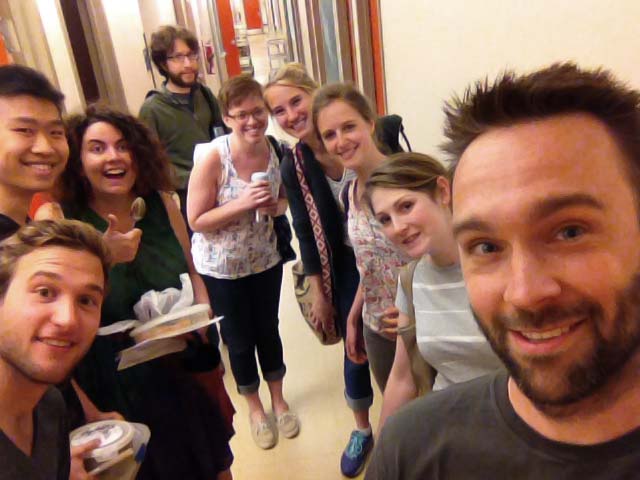 Yesterday we took advantage of some great weather and ate lunch outside while reading the recent neurogenesis-forgetting paper from the Frankland/Josselyn group. It basically flips the field on its head by looking at retrograde effects of neurogenesis on memory, instead of the usual approach of looking at neurogenesis effects on future learning. With the finding being that neurogenesis promotes forgetting of already-formed memories. A few thoughts that emerged from our discussions:
Yesterday we took advantage of some great weather and ate lunch outside while reading the recent neurogenesis-forgetting paper from the Frankland/Josselyn group. It basically flips the field on its head by looking at retrograde effects of neurogenesis on memory, instead of the usual approach of looking at neurogenesis effects on future learning. With the finding being that neurogenesis promotes forgetting of already-formed memories. A few thoughts that emerged from our discussions:
- are good and bad memories forgotten equally? is it always advantageous to forget?
- hilarious that you have to go to the supplementary material to find out the y-axis units for the (19) cell count graphs
- how much does neurogenesis have to increase/decrease to promote/reduce forgetting? Is there a threshold? This stemmed from the observation that normal mice, that do have neurogenesis, show no context fear forgetting between 1-28 days.
- given all the attention this paper is getting, are we going to see an international decline in public health since now everyone is worried that by exercising they might lose all their memories?
Does actively using the memory while increasing neurogenesis protect the memory? Are consolidated memories protected from forgetting in neurogenesis? (ie: have memory traces already in the CA3?).
Another weirder way I like to think about the results is maybe with excessive neurogenesis, memories are encoded with such contextual specificity that subjects don’t recall the memory because the enviroment is just slightly different from the previous enviroment. From a behavioural point of view it looks like the subjects lost their memory.
Interesting questions. I would guess that continuing to use the memory while increasing neurogenesis would protect it. Your 2nd idea is also intriguing, that increasing neurogenesis perhaps makes the memory so accurate that during remote retrieval the temporal context change is enough to render it distinct. Definitely worth keeping in mind…
I was wondering if the environment the mice is exposed to as while its making these new neurons in its DG can affect this forgetting. Is it possible that these newly formed neurons will be recruited to encode some of that memory? If so, then depending on the level of overlap between the engram encoding this environment and those encoding contextual fear memory might affect the level of forgetting. And possibly, assuming that were indeed to be so, can this be used as a proxy to say if two memory traces are encoded by hippocampus in two spatially separate and functionally non-overlapping networks?